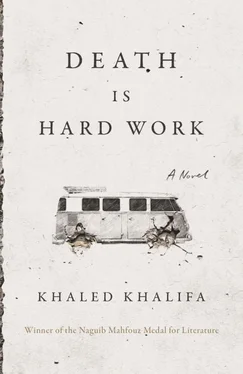Bolbol closed his eyes and relaxed. The cool breeze had revived him and woke again his longing for the old days with Lamia. He’d felt proud when she had looked at him with affection for carrying out his father’s last wish. He had declared to Lamia that he would see to it that Abdel Latif was buried with Aunt Layla (whose story Lamia knew a little about) no matter how dangerous the journey became—saying that he would carry out his father’s last wish even if it cost him his life. In front of Lamia, he affected to be careless about his life, as he imagined a brave man might. She wasn’t surprised; he had a history of doing idiotic things no one would have believed him capable of.
When Zuhayr had disappeared into prison, who knew where, Bolbol had gone to meet an influential officer, a relative of one of his friends, and asked outright about his whereabouts. Even now Bolbol couldn’t forget the quizzical look on the man’s face as he sought to clarify the nature of the relationship between Bolbol and Zuhayr. That simple question, asked for the sake of a person he didn’t really know, could have consigned Bolbol to an endless nightmare. And Lamia still remembered the night her mother died; she had been astonished to see Bolbol arriving before dawn, wanting to help with the burial. He had traveled all night despite the challenge of finding transport at that time. He had done many things for her over the years, and after the looks of gratitude she had given him he began to feel that he was carrying out his father’s instructions solely on her account.
Lamia was one of the few people—perhaps the only one—who gave Bolbol the courage to act recklessly. She never knew it, but his greatest follies had been committed on account of just a few words she’d once spoken in defense of his character, calling him “bold” and “impetuous” when his other friends preferred “indecisive” and “cowardly.” Her belief in the courage he in fact lacked had helped him commit more than a few sins in his time (sadly, they went unremembered by all), but despite everything, he had never been brave enough to declare his love for her. Even now his knees started to shake as he imagined what she would say to him: The right moment for this passed a long time ago.
Discovering love is like seeing a bouquet floating down a river. You have to catch it at the right time, or the river will sweep it away: it won’t wait for long. You have only a few intense, mad moments to give voice to your profound desires. In fact, there had been plenty of bouquets floating tranquilly by, rocking gently close at hand, easily within Bolbol’s reach… Lamia had waited for him to say something, especially after the long summer holidays were over, but Bolbol stayed silent as usual or merely suggested a walk in Bab Tuma. Eventually she realized that the years she had spent waiting for him to pick up those bouquets floating down the river were over, but despite knowing that they had missed their chance, she didn’t conceal her happiness at receiving his letters nor her longing for the next. And so, the thread of their usual conversations would resume where it had been broken by their separation while the river swept the bouquet away.
Whenever she went home for the holidays, she was astonished at the letters that were already waiting for her in her hometown. Bolbol wrote that the very sound of her footsteps was his joy. He even described her handbag in terms borrowed extensively from an ode of the great poet Riyadh al-Saleh al-Hussein. He told her that he had read the poem in question the previous day, on account of her, and on account of her he had also gone to the empty college canteen and sat on their seat in the garden. She replied to every one of his holiday letters, told him how much she missed him, and she didn’t bother to hide her happiness at everything he wrote. Sometimes she put a few small wildflowers in her replies, letters that he read dozens of times and kept in a secret place in his closet, afraid they would fall into someone else’s hands. For him, these weren’t letters but an enormous and personal secret. They were like precious icons hidden in the deepest vaults of a monastery, forbidden and untouched for hundreds of years. As time passed, the secret cast a hidden magic over things; what Bolbol wanted was for Lamia’s letters to become enshrined just as he imagined them, a real collection of icons he might suddenly reveal to his future children, after many years, so they would be forced to see their father in an entirely new light.
Yes, he’d missed his chance to pick up that bouquet hundreds of times. Deep down, he still believed that she was a goddess who deserved to be worshipped, not approached. One touch from her was enough for him; he couldn’t imagine her as a wife chopping onions, her clothes reeking of cooking smells. But now everything had been lost, regardless, and he was content with what remained of their relationship. Here and now she looked like an angel to Bolbol, an angel reaching out her hand to save the drowning; humanity’s only hope lay in her delicate fingers, which could grant life with one affectionate touch.
Bolbol had convinced himself that merely retaining her friendship was a miracle for which he should thank God. He would wait for her to visit Damascus and then take her to the restaurants she loved. Sometimes, and quite intentionally, he took her to places of special importance to their past relationship, where he was tempted to reach out and take her hand. She was polite and friendly to him in those moments, but the silence which soon settled over them made it clear that the past was the past. Then they would return to their favorite topic of conversation when things became awkward: Bolbol would speak and she would listen as he complained about his wife, who thought that buying a new sofa would be preferable to climbing up to the roof of the world and taking in the view. He told her about his wife’s repugnant smell, her hardness and utter lack of concern about him. He complained about their sex life; she called the deed “homework” and laughed endlessly at this little witticism. He described her yellow teeth and her never-ending list of demands: fix the boiler, stock up enough fuel for winter, invite her sister and her husband for dinner. Bolbol would then go on to describe what happened whenever the four of them met: his brother-in-law talked constantly about house prices and would end the evening by advising Bolbol in his hoarse voice to convince his father to sell the large family house or to knock it down and build an apartment block so Abdel Latif could sell off the individual apartments. Bolbol didn’t know how to extricate himself from this situation, he said, but he never allowed his impatience with his wife or her family to show. He remained the same kind man as ever, who allowed his foolish brother-in-law to appear smart and continually advise him how to arrange his life. Still, Bolbol always concluded this litany by restating his regret at having married a woman who didn’t know the poetry of Riyadh al-Saleh al-Hussein—whose conversation consisted entirely of repeating the silly jokes she had been told by colleagues during her trivial day.
As he looked at his shrouded father, Bolbol told himself that he had no regrets at not trying to convince him to sell the house with the flowers Lamia had loved. She used to exchange seedlings with Abdel Latif and spent hours helping him arrange the flower beds. It gave them both indescribable joy, a joy shared by Bolbol’s mother, who adored her plants to the point of madness. Bolbol had often observed his mother and father in the garden, lingering over the harvest of their three olive trees. They behaved like the seasonal workers, eating breakfast under the tree and discussing how much of the harvest to give their friends. Bolbol told Lamia that the flowers were a love token between his parents; he meant that they were a secret token of his own love for her, one of many. He didn’t dare tell her that he lingered to breathe in the fragrance of every flower she herself had pruned or caressed.
Читать дальше












